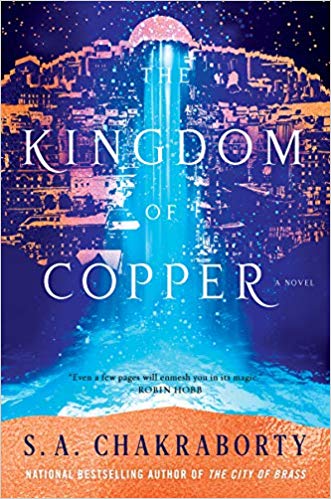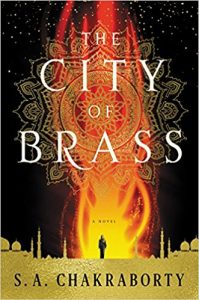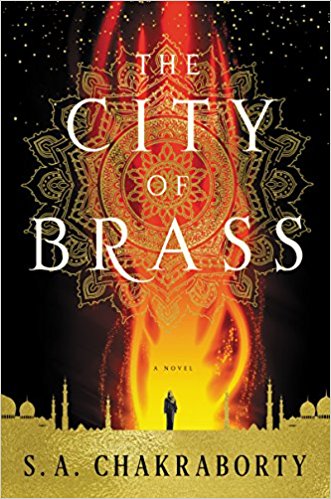 The Kingdom of Copper (The Daevabad Trilogy, #2) by S.A. Chakraborty
The Kingdom of Copper (The Daevabad Trilogy, #2) by S.A. Chakraborty Format: eARC
Source: supplied by publisher via Edelweiss
Formats available: hardcover, paperback, large print, ebook, audiobook
Genres: epic fantasy, fantasy
Series: Daevabad Trilogy #2
Pages: 640
Published by Harper Voyager on January 22, 2019
Purchasing Info: Author's Website, Publisher's Website, Amazon, Barnes & Noble, Kobo, Bookshop.org
Goodreads
S. A. Chakraborty continues the sweeping adventure begun in The City of Brass—"the best adult fantasy I’ve read since The Name of the Wind" (#1 New York Times bestselling author Sabaa Tahir)—conjuring a world where djinn summon flames with the snap of a finger and waters run deep with old magic; where blood can be dangerous as any spell, and a clever con artist from Cairo will alter the fate of a kingdom.
Nahri’s life changed forever the moment she accidentally summoned Dara, a formidable, mysterious djinn, during one of her schemes. Whisked from her home in Cairo, she was thrust into the dazzling royal court of Daevabad—and quickly discovered she would need all her grifter instincts to survive there.
Now, with Daevabad entrenched in the dark aftermath of a devastating battle, Nahri must forge a new path for herself. But even as she embraces her heritage and the power it holds, she knows she’s been trapped in a gilded cage, watched by a king who rules from the throne that once belonged to her family—and one misstep will doom her tribe..
Meanwhile, Ali has been exiled for daring to defy his father. Hunted by assassins, adrift on the unforgiving copper sands of his ancestral land, he is forced to rely on the frightening abilities the marid—the unpredictable water spirits—have gifted him. But in doing so, he threatens to unearth a terrible secret his family has long kept buried.
And as a new century approaches and the djinn gather within Daevabad's towering brass walls for celebrations, a threat brews unseen in the desolate north. It’s a force that would bring a storm of fire straight to the city’s gates . . . and one that seeks the aid of a warrior trapped between worlds, torn between a violent duty he can never escape and a peace he fears he will never deserve.
My Review:
 The previous book in this series, The City of Brass, was absolutely awesome, as is this one. But the end of City felt guardedly hopeful. Five years down the road, the future that resulted from that guarded hope is anything but.
The previous book in this series, The City of Brass, was absolutely awesome, as is this one. But the end of City felt guardedly hopeful. Five years down the road, the future that resulted from that guarded hope is anything but.
Instead, The Kingdom of Copper has the feel of The Two Towers, in that things are always darkest just before they turn completely black. And also in the sense that The Two Towers makes no sense without having read The Fellowship of the Ring first.
Likewise The Kingdom of Copper makes no sense without having read The City of Brass first. We readers need that introduction into the characters and especially the hidden city of Daevabad before we have a clue about what’s going on in this book – or why we should care.
Fair warning, if your reading of City was a while ago, it may take a while to get back to the heart of the matter in Kingdom. The worldbuilding in this series is epically dense. Not impenetrable, just terribly, terribly complex.
At the end of City, Nahri had negotiated her marriage with Crown Prince Muntadhir of Daevabad in exchange for an extremely large dowry and some concessions for her downtrodden people. Then her friend, Prince Ali, killed her would-be lover, the djinn Darayavahoush. Ali was exiled, and Dara was just gone.
Nahri is alone in a city she never knew existed, under the watchful eye of her cruel and tyrannical father-in-law. She does her best not to put a foot wrong, because every time she does anything just slightly for herself, the King punishes someone close to her. Ghassan’s treatment of Nahri is a microcosm of how he rules his kingdom. Neither are exactly flourishing under his “care”.
But the way that Daevabad is ruled seems necessary from the king’s perspective. His people, the Geziri, conquered the city that belonged to Nahri’s people, the Daevas, generations ago. But the Geziri are the minority in the city that they rule, outnumbered by both the oppressed Daevas and the completely subjugated shafit, who are djinn with human ancestry.
The king feels that it is necessary to keep the Daevas and the shafit at each other’s throats to keep them from banding together and turning against their oppressors. (And if anyone sees echoes of many past and present tyrannies, it’s probably not accidental).
From Nahri’s perspective we see events in the city, but that’s not all that we see. Ali has survived many attempted assassinations by his father-the-king’s agents, and is living a life of sort-of-peace and increasing prosperity in the desert that is the Geziri home. Or he is until his mother’s family maneuvers him, yet again, into a position where he feels he has no choice but to return to Daevabad and his father’s dubious mercy.
While it is pretty obvious to Ali that his mother’s relatives want him to take steps against his father, their methods are generally more political, economic and subtle than the other player in this game of empires.
Because the djinn Dara is not dead after all. Or does not remain dead – again. The exiled Daevas have a plan to retake their city. A plan for which they need the assistance of the greatest warrior – and most feared weapon of mass destruction – that their people have ever produced. Both are in the person of Dara, who just wants to stay dead, but is honor bound to serve his people one more time.
There’s going to be a bloodbath in the city that they all claim to love – with Nahri, Ali and Dara caught in the middle. Again.
Escape Rating A: This book was terrific. And compellingly readable to the point where I finished at 3 am because I just couldn’t stop reading. At the same time, it just misses the A+ because it takes a while to get back into the action. There’s a lot going on in this story, and it’s all predicated on the events of the previous book. I suspect that if I’d read City a month or two ago instead of over a year ago I might feel differently.
If the final edition includes a precis of previous events that will probably help – a LOT.
Part of what makes this story so good, as well as what makes it difficult to get back into after a long absence, is the combination of how densely packed the worldbuilding is and how different it is from the western mythic traditions that so often underpin epic fantasy.
The worldbuilding in the Daevabad Trilogy is based on what feels like a combination of Indian, Persian and Arabic resources. The history hearkens back to Suleiman, the Islamic name of King Solomon the Wise from the Jewish Torah and the Christian Bible. The world of the Daevabad seems to be the result of Suleiman’s taming or subjugation of the Djinn, an event which exists in all three mythologies.
But most readers have an image in their heads for djinn, jinn, or the more popular term, genie. (If that image looks and sounds a lot like Robin Williams as the genie in Aladdin, well, Disney is also a mythmaker.)
The djinn in Daevabad are not those genies. Well not exactly. And not always. It feels like Dara might be a lot like those djinn, or genies – without the benevolent wish granting. But most djinn in this series seem to be basically people, with magical abilities and an affinity for one or more elements as granted by their heritage.
It takes a bit to stop thinking genie when one reads the word djinn and just think of them as warring tribes of magical people. But it’s definitely worth the mental leap to make it work for you.
Underneath the terminology, the story here is definitely a classic, using multiple tropes to underpin the story.
The obvious one is that age-old saw about power corrupting and absolute power corrupting absolutely. Not just for the current ruler of Daevabad, but also those who would be the rulers. It’s also definitely a story about the corruption of believing that the ends justify the means.
Nahri is certainly the bird in the gilded cage in this installment. After the life of both freedom and insecurity she lived in Cairo, her life in Daevabad is constrained at every turn. It’s only at the end when she returns to the truths she learned during her life on the streets that she finally sees a way out – even if it’s not one that anyone wants to take.
This is also a triangle story, albeit one with some interesting offshoots. Nahri loves Dara, or at least the Dara she thought she knew before she discovered that he was essentially a war criminal. Dara loves her, but the version of her that he left behind when he died. Five years of realpolitik have changed Nahri from that relatively naive girl he left behind.
Ali probably loves Nahri. Or he is capable of it if he figures out what love is – and gets his head out of his own ass on a whole host of topics. And possibly just plain grows up a bit. But Nahri is his brother’s wife. His brother Muntadhir loves his best friend Jamshid – and vice-versa – even though they keep their relationship on the down low. And Jamshid owes fealty to Nahri as the leader of the Daevas.
It’s complicated.
But the real story feels like one about the cost of vengeance. The Geziris conquered Daevabad, so now they oppress and demonize the descendants of the conquered to the point where the Daevas feel as if they have no option but to overthrow the Geziris. And both sides subjugate the mixed-blood shafit at every turn. No one is willing to even talk about building a future together, because everyone is so fixated on the atrocities that their ancestors committed against each other. Which only results in more atrocities. And the cycle continues.
And if that scenario sounds familiar, it bloody well should.
In an interview, the author posited what feels like the point of the entire series when she said, “Can you ever make a new world that properly addresses the wounds of the past?” So far in this series, the answer is a resounding, but absolutely compelling, NO.
So far in Daevabad, no one is even trying. Hopefully they will in the untitled third book in this series, which is not scheduled until (boo-hoo) 2021. It’s going to be a long wait.

 The City of Brass (The Daevabad Trilogy, #1) by
The City of Brass (The Daevabad Trilogy, #1) by